Eggplants are delicious and versatile vegetables enjoyed in various dishes. If you’re growing Eggplant plants in pots, you might wonder how to increase Eggplant yield and ensure a bountiful harvest. When growing Eggplants in containers, choosing the right fertilizer ensures healthy plant growth and abundant harvests.
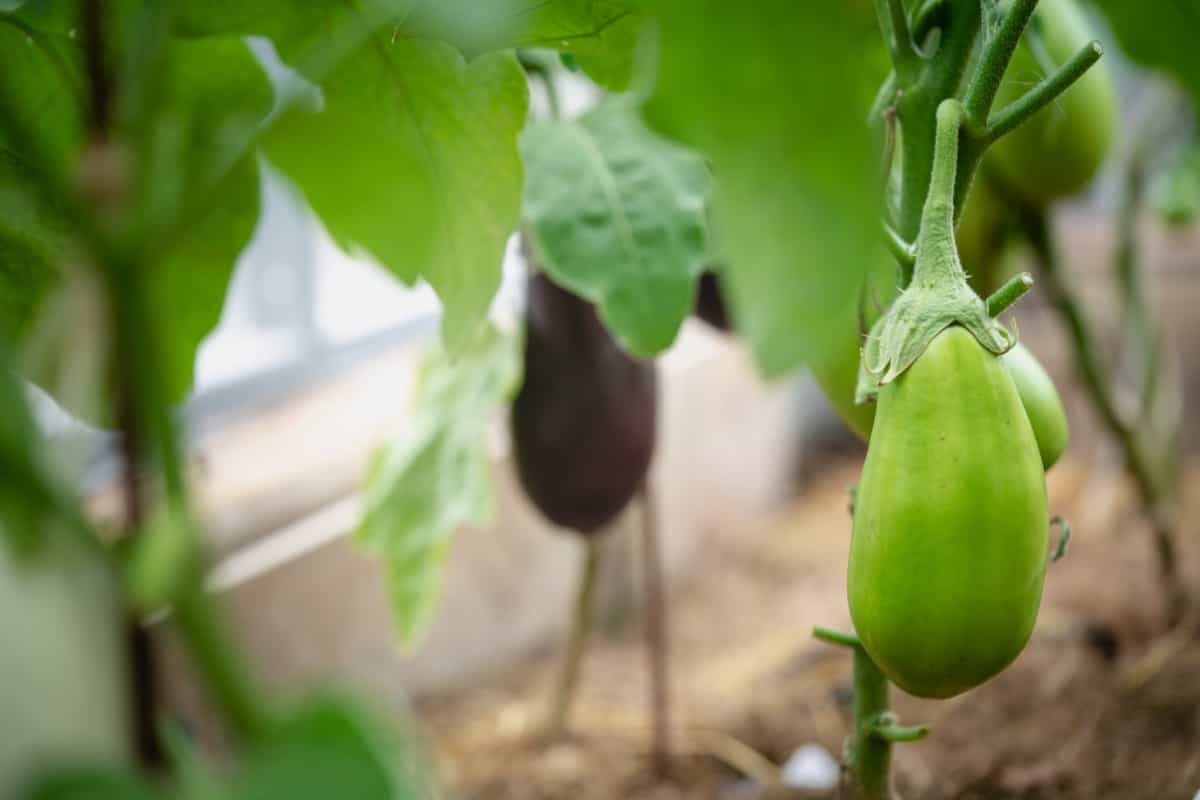
While numerous fertilizers are available on the market, finding the best one for your potted Eggplant plants can be overwhelming. By providing adequate nutrition through suitable fertilization methods, you can increase the yield of your potted Eggplant plants and enjoy a bountiful harvest season after season. Experiment with different types of fertilizer to find what works best for you, and watch your Eggplants thrive.
Best Fertilizers for Eggplant Plants in Pots
Organic Fertilizers for Eggplant Plants in Pots
Eggplant plants grown in pots require the right kind of nourishment to thrive and produce a bountiful harvest. One excellent option for feeding your potted Eggplants is organic fertilizers. These natural alternatives provide essential nutrients and promote soil health and sustainability. One of the best organic fertilizers for Eggplants is compost.
Compost contains high organic matter, which improves soil structure and fertility. Additionally, fish emulsion-based fertilizers are high in nitrogen and immediately boost plant growth without harming beneficial soil organisms. Other organic options include blood or feather meals with higher nitrogen content.
Best Slow-release Fertilizers for Potted Eggplant Plants
Slow-release fertilizers are perfect for long-lasting nourishment for your potted Eggplant plants. These fertilizers work gradually over time, releasing nutrients into the soil to ensure your Eggplants receive a steady supply of essential elements. One excellent option is a granular slow-release fertilizer with a balanced NPK ratio. Look for one with an equal or slightly higher percentage of nitrogen, phosphorus, and potassium.
In case you missed it: How to Grow Eggplant/Brinjal from Seed to Harvest: A Complete Guide for Beginners
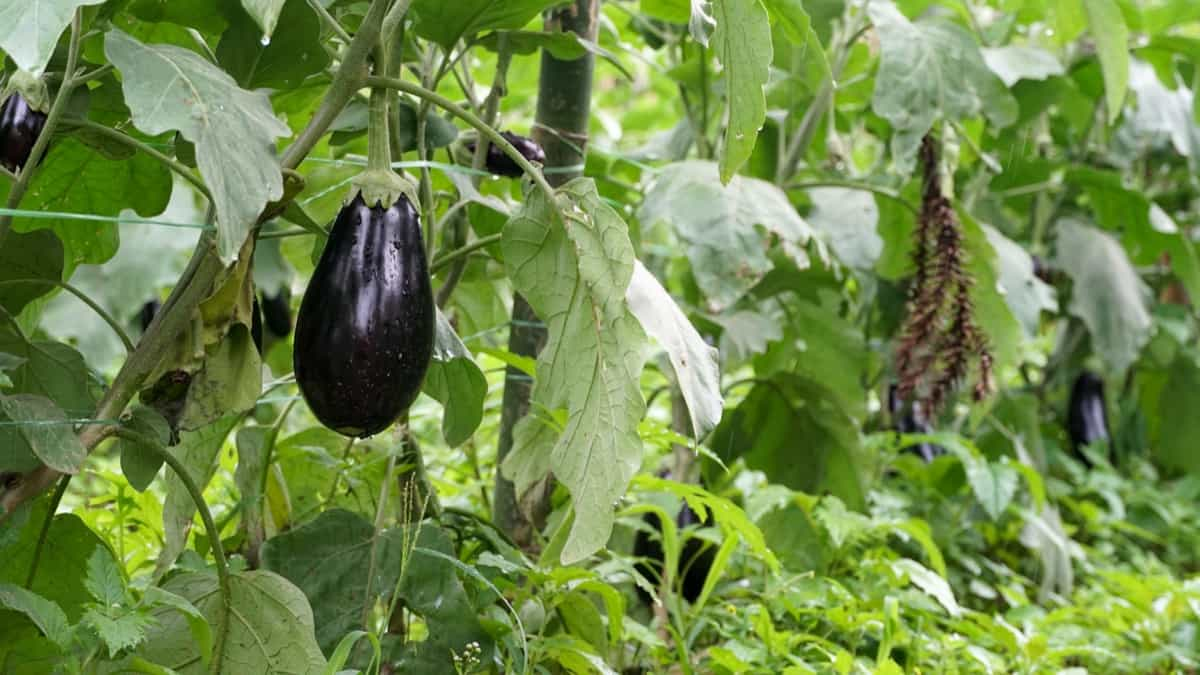
This will support plant growth and development while promoting healthy fruit production. Another great option is organic slow-release fertilizers. Made from natural ingredients like composted manure or bone meal, these fertilizers provide essential nutrients and improve soil structure and fertility. They are gentle on plants and beneficial for the environment.
Liquid Fertilizers for Container-grown Eggplant Plants
Liquid fertilizers are convenient and effective for nourishing your container-grown Eggplant plants. One benefit of using liquid fertilizers for Eggplants is that they provide nutrients quickly and efficiently. When diluted with water and applied to the soil, the nutrients are readily absorbed by the roots, allowing your Eggplants to receive an instant boost of essential elements like nitrogen, phosphorus, and potassium.
Some popular options for liquid fertilizers include fish emulsion-based products or seaweed extracts. These organic alternatives provide essential macronutrients and trace minerals, contributing to healthy plant growth. Always follow manufacturer instructions when applying liquid fertilizers and avoid over-fertilization, which could lead to nutrient burn or damage to your Eggplant plants.
Natural Fertilizers for Potted Eggplant Plants
Making homemade fertilizer is one of the most cost-effective and eco-friendly ways to fertilize Eggplant plants in pots. By using ingredients commonly found in your kitchen or garden, you can provide the necessary nutrients for healthy growth and abundant harvests. One option for a homemade fertilizer for Eggplant is banana peel tea. Until they break down, soak banana peels in water for a few days.
Then strain the liquid and use it to feed your Eggplants. Banana peels contain potassium, which promotes fruit development. Another natural fertilizer for Eggplants is fish emulsion. This liquid fertilizer is made from fish waste and provides a rich nitrogen, phosphorus, and potassium source. It also contains trace minerals that promote healthy growth. Natural fertilizers offer an eco-friendly way to nourish your potted Eggplant plants.
High-nitrogen Fertilizers for Eggplant Plants in Containers
Eggplant plants require good nitrogen to thrive and produce healthy fruits. When growing Eggplants in containers, it becomes crucial to provide them with high-nitrogen fertilizers that promote robust growth and abundant yields. One excellent option for high-nitrogen fertilizers is a blood meal. This organic fertilizer releases nitrogen slowly, providing a steady supply for your potted Eggplants. Another great choice is fish emulsion, which contains high nitrogen levels and provides essential micronutrients.
In case you missed it: 21 Common Eggplant Problems: How to Fix Them, Solutions, and Treatment
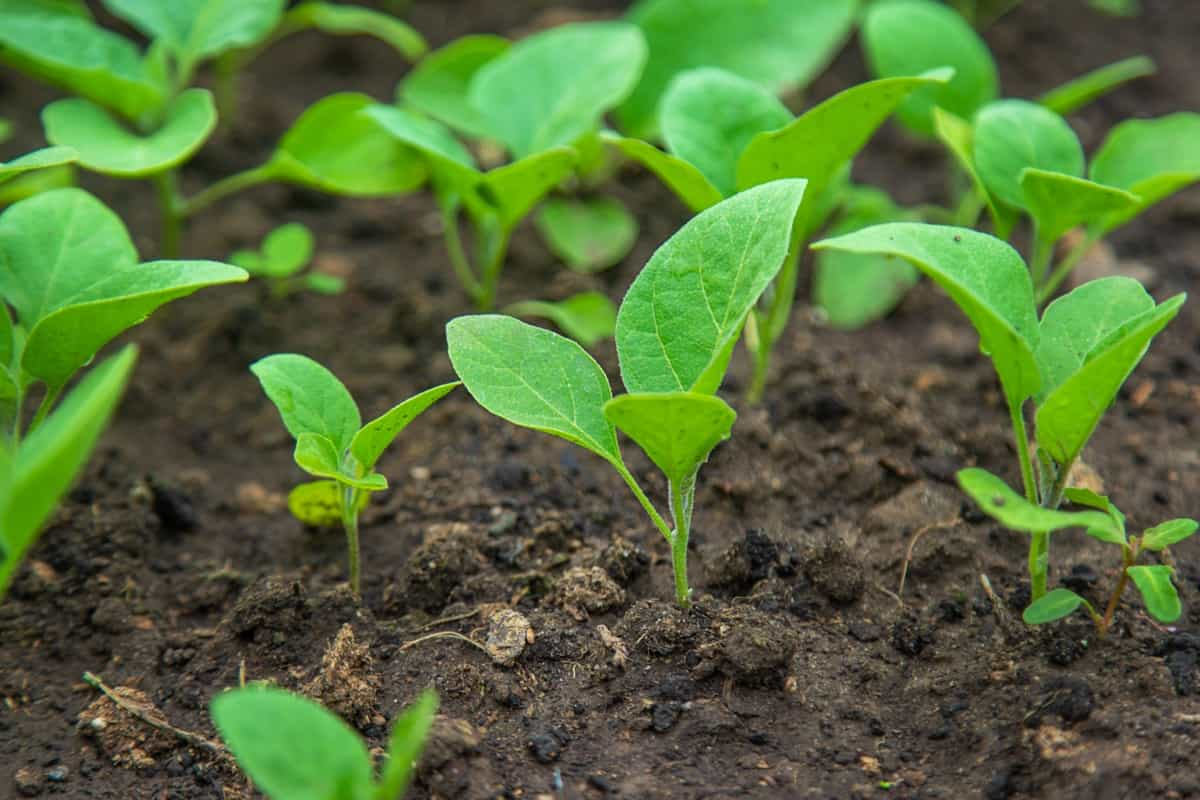
If you prefer synthetic fertilizers, consider those with a higher first number in their N-P-K ratio. For example, a 20-10-10 fertilizer will have a higher nitrogen percentage than phosphorus and potassium. When applying high-nitrogen fertilizers to your container-grown Eggplants, it’s important not to overdo it. Excess nitrogen can cause excessive vegetative growth at the expense of fruit production.
Balanced Fertilizers for Potted Eggplant Plants
Choosing the right fertilizer for your potted Eggplant plants ensures their healthy growth and abundant yields. When it comes to balanced fertilizers, you want a product that provides an equal balance of essential nutrients – nitrogen, phosphorus, and potassium. Nitrogen is responsible for leaf and stem development; phosphorus enhances root growth and flower production, while potassium aids plant health and disease resistance.
When choosing an NPK fertilizer for Eggplant plants, look for a balanced ratio such as 14-14-14 or 10-10-10. When using a 14-14-14 fertilizer for Eggplant plants, ensure they receive balanced nutrition throughout their growth cycle. Remember to follow the manufacturer’s instructions regarding application rates and frequency to avoid over-fertilization, which can lead to nutrient imbalances or even harm your plants.
Look for organic options such as compost or well-decomposed manure, which provide the necessary nutrients and improve soil structure and fertility over time. Alternatively, there are commercially available balanced fertilizers specifically formulated for potted plants. These often come in granular or liquid forms, allowing for easy application and absorption by the plant’s roots. Remember to follow the manufacturer’s instructions when applying any fertilizer, as over-application can lead to nutrient imbalances or even damage your Eggplants.
In case you missed it: Soil Preparation for Eggplant/Brinjal: Best Soil Mix, pH, Compost, and Recipe
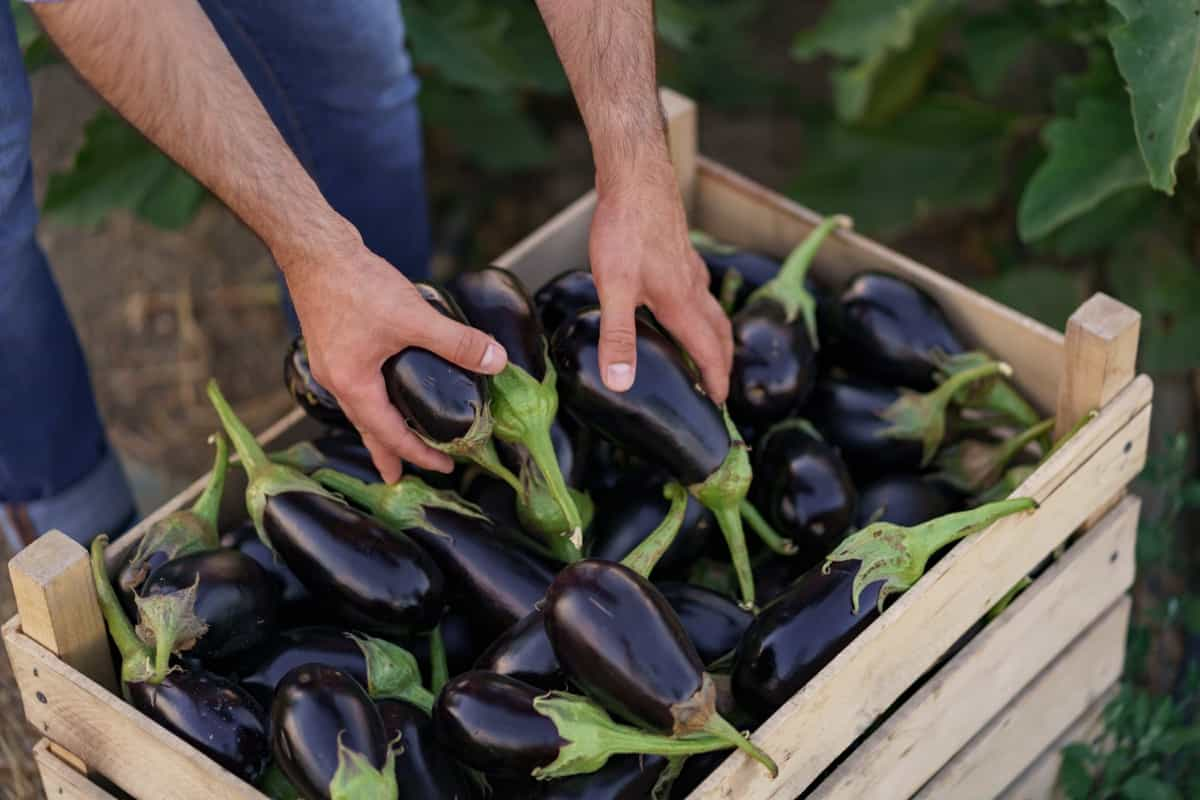
Fertilizer Recommendations for Growing Eggplants in Pots
When growing Eggplants in pots, choosing the right fertilizer is essential for their overall health and productivity. Organic fertilizers are a great option, providing essential nutrients without harmful chemicals. Look for organic fertilizers specifically formulated for vegetables or fruits to ensure proper nutrition. When choosing fertilizer for Eggplant seedlings, it requires a delicate balance of nutrients to grow healthy and strong.
Slow-release fertilizers are another excellent choice for potted Eggplant plants. These granules release nutrients gradually over time, providing a steady supply of nourishment to your plants. This not only reduces the risk of nutrient deficiencies but also prevents over-fertilization. Liquid fertilizers can be easily absorbed by container-grown Eggplant plants, making them a convenient option. Opt for liquid fertilizers high in nitrogen, phosphorus, and potassium – the three key nutrients Eggplants require.
Balanced fertilizers containing equal nitrogen, phosphorus, and potassium ratios ensure that all aspects of plant growth – from root development to flowering and fruiting – receive adequate nutrition. To determine the best Eggplant fertilizer recommendation when growing pots, consider soil quality, plant size, weather conditions, and desired yield. Conduct regular soil tests throughout the growing season to monitor nutrient levels accurately.
Fertilizer Schedule for Potted Eggplant Plants
When fertilizing your potted Eggplant plants, timing and consistency are key. A well-planned fertilizer schedule can help ensure that your plants receive the nutrients they need at the right times. In general, Eggplants benefit from regular feeding throughout their growing season. Start by applying a balanced fertilizer with equal amounts of nitrogen, phosphorus, and potassium when transplanting your seedlings into pots. This will give them a healthy start.
After four weeks, switch to a high-nitrogen fertilizer to promote leafy growth. Nitrogen is essential for healthy foliage development, especially for Eggplants, which rely on photosynthesis to produce energy. Once your plants start flowering, it’s time to shift gears again. Switch to a balanced fertilizer with slightly higher phosphorus content to encourage fruiting and plant health.
Feed your potted Eggplants every four weeks or so throughout the growing season with either slow-release granular fertilizers or liquid fertilizers diluted according to package instructions. Slow-release options provide a steady supply of nutrients over an extended period, while liquid fertilizers deliver quick results.
Best Granular Fertilizers for Growing Eggplants in Pots
When growing Eggplants in pots, choosing the right fertilizer is essential for healthy growth and abundant harvests. Granular fertilizers are popular among gardeners because they slowly release nutrients over time. This ensures that your Eggplant plants receive a steady supply of essential elements for optimal growth. One excellent granular fertilizer option for potted Eggplant plants is a balanced formula with an NPK ratio of around 10-10-10 or 14-14-14.
In case you missed it: Best Fertilizer for Eggplant: Homemade, Liquid, Organic, Compost Manure, NPK, and Schedule
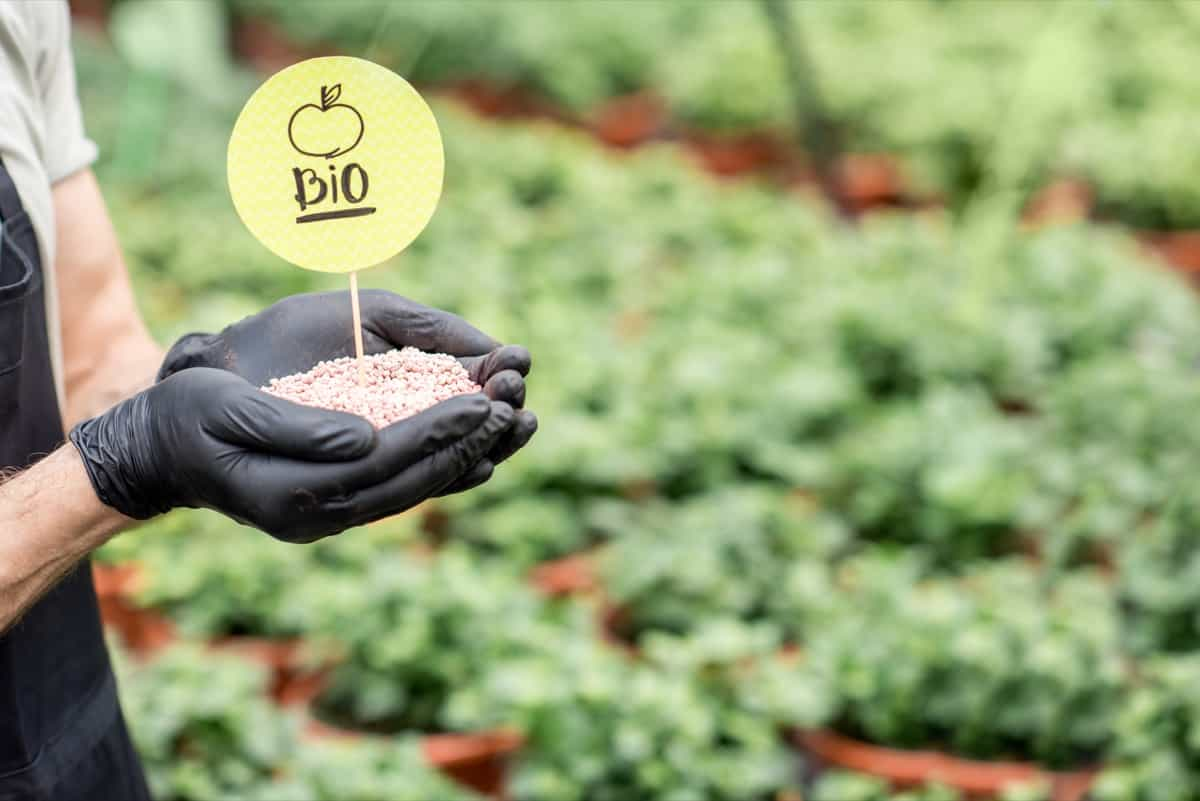
A balanced formula provides all three major nutrients necessary for overall plant development. Another great choice is using organic granular fertilizers from natural ingredients such as composted manure, bone meal, or fish meal. Organic fertilizers nourish plants, improve soil health, and promote beneficial microbial activity. To ensure proper application, follow the instructions provided on the fertilizer packaging regarding dosage and frequency. Generally, you can apply granular fertilizers by spreading them evenly around the base of each plant and gently working them into the top layer of soil.
Fertilizer Ratios for Potted Eggplant Plants
Fertilizer ratios ensure potted Eggplant plants’ healthy growth and productivity. When it comes to feeding your Eggplants, finding the right balance of nutrients is key. One commonly used ratio for fertilizing potted Eggplants is 14-14-14, which represents the fertilizer’s nitrogen, phosphorus, and potassium percentages. While this balanced ratio can provide overall nutrition to your plants, you may also consider adjusting the ratios based on specific needs.
For instance, if your Eggplants lack foliage growth, using a higher nitrogen fertilizer with a ratio of 20-10-10 might be beneficial. On the other hand, if you want to promote flowering and fruiting, using a higher phosphorus fertilizer with a ratio of 10-20-20 can stimulate these processes.
Potassium-rich fertilizers with ratios like 5-10-15 are great for enhancing root development and improving plant tolerance against diseases. Remember that every garden is unique, so observing your plants closely and adjusting accordingly is important. Regular soil testing can also help determine any nutrient deficiencies or imbalances that need addressing.
Slow-release Organic Fertilizers for Container-grown Eggplants
Slow-release organic fertilizers are the best option for container-grown Eggplants. These fertilizers provide a steady release of nutrients over an extended period, ensuring that your plants consistently receive the necessary nourishment. One popular slow-release organic fertilizer is compost. Compost enriches the soil with beneficial microorganisms, improves soil structure, and helps retain moisture – all crucial factors for healthy Eggplant growth.
Another excellent slow-release option is worm castings or vermicompost. Worm castings are rich in beneficial bacteria, enzymes, and micronutrients that promote strong root development and overall plant health. They also enhance soil fertility by improving nutrient availability to the plants. Fish emulsion is another effective slow-release fertilizer choice for potted Eggplants. It provides a balanced mix of nitrogen, phosphorus, potassium, and trace minerals essential for healthy plant growth. The fish emulsion also helps stimulate microbial activity in the soil.
Fertilizer Application Techniques for Eggplants in Pots
Fertilizer application techniques are crucial in ensuring healthy and productive Eggplant plants in pots. One important technique is to apply the fertilizer evenly across the soil surface, avoiding direct contact with the plant stems or leaves. This can be achieved by sprinkling granular fertilizers around the base of the plant.
Another effective technique is foliar feeding, where liquid fertilizers are sprayed directly onto the foliage of Eggplant plants. This allows for quick absorption of nutrients through the leaves, providing an immediate boost to plant growth and development. However, it’s important to follow manufacturer instructions regarding dilution ratios and frequency of application.
In case you missed it: Eggplant Gardening Frequently Asked Questions (FAQs)
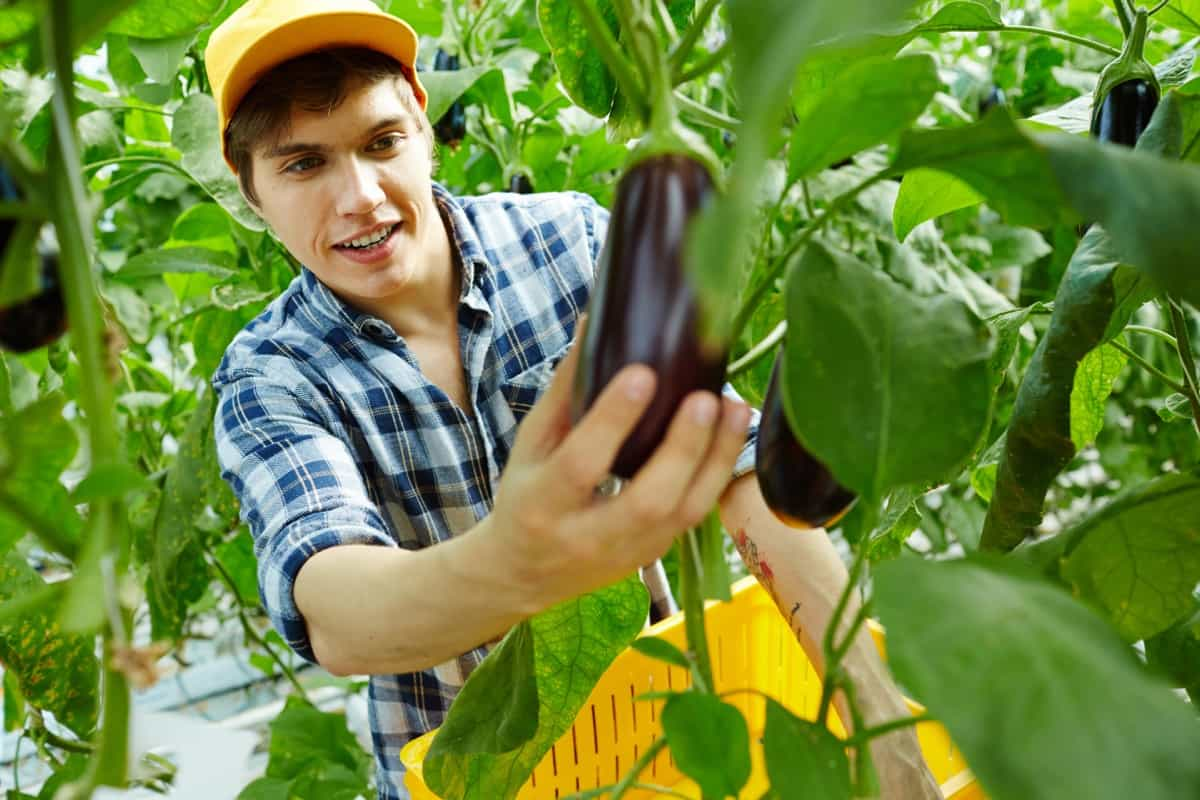
Deep-root fertilization is also beneficial for potted Eggplants. By inserting a slow-release fertilizer spike or using a special deep root feeder tool, nutrients can reach deeper layers of soil where roots can access them more effectively. Regular monitoring of soil moisture levels is essential when applying fertilizers to potted Eggplants. Over-fertilizing or applying fertilizer on dry soils can lead to nutrient burn or damage to sensitive roots.
Conclusion
Choosing the right fertilizer for your potted Eggplant plants is crucial for their growth and productivity. Organic fertilizers provide a natural and sustainable option, while slow-release fertilizers ensure a steady supply of nutrients over time. Liquid fertilizers offer quick absorption and are convenient, while natural options like compost and manure can enrich the soil with essential elements.
Remember to apply fertilizers correctly by following recommended dosage instructions provided on the packaging. Over-fertilization can lead to nutrient imbalances or even damage your plants. Additionally, consider supplementing commercial products with homemade organic alternatives such as compost tea or vegetable-based liquid fertilizers.
- How to Grow Tomatoes Organically at Home: A Comprehensive Guide
- Organic Gardening on a Budget: Low-Cost Methods and Materials
- Gongura Seed Germination and Planting Methods
- Cabbage Seed Germination and Selection
- Broccoli Seed Germination and Selection
- Asparagus Seed Germination and Variety Selection
- Seasonal Flower Gardening: Best Practices for Spring, Summer, Fall, and Winter
- How to Grow Hibiscus from Flower
- Plantation Ideas for Home Decoration: A Beginners Guide
- Flower Garden Designs and Layouts for Beginners
- Planting and Spacing Techniques in Papaya: A Beginner’s Guide
- Growing Gold: Essential Techniques for Planting Pineapples
- How to Make Kalanchoe Plant Bushy: Home Remedies and Solutions
- 11 Reasons Why Your Gardenia is Not Blooming: Home Remedies and Solutions
- Eco Elegance: The Guide to Designing a Drought-Tolerant Landscape
- Gardening on a Slope: Strategies for Hillside Landscaping
- Nourish and Flourish: Top Organic Mulches for Thriving House Plants
- Everything You Want to Know about Indian Mogra Flower: Discover Uses and Growing
- Green Thumb Success: Expert Tips for Cultivating Greenhouse Pumpkins All Year Round
- Maximize Growth & Flavor: The Ultimate Guide to Companion Planting in Herb Gardens
- How to Control Rhododendron Problems Naturally: Home Remedies and Organic Ways to Fix Them
- Natural Magic: The Remarkable Benefits of Cinnamon for Plants
- Best Steps to Revive Dying Tulip with Natural and Organic Treatment
- 10 Reasons Why Your Angel Trumpet is Not Blooming: Remedies and Treatment
- How to Fix Periwinkle Leaf and Flower-Related Problems: Natural Remedies and Solutions
- How to Fix Zinnias Leaf and Flower Problems: Discover Natural and Home Remedies
- Organic Steps to Induce Lemon Tree Flowers: A Comprehensive Guide
- Bloom Booster: Crafting the Perfect Homemade Bougainvillea Fertilizer
- Optimizing Growth: A Guide to Applying NPK Fertilizer for Potted Plants
- 10 Best Homemade Fertilizers for Rubber Plant: DIY Recipes and Application Method
- How to Boost Female Pumpkin Flowers: Effective Steps for More Flowers and High Yields
- Transform Your Indoor Garden: Top Benefits of Pink Salt for Houseplants
- 10 Best Homemade Fertilizers for Peacock Plants (Calathea): Easy DIY Guide
- Unlock Blooms: 9 Reasons Why Your Potted Chrysanthemum is Not Blooming
- 8 Reasons Why Your Potted Hibiscus is Not Blooming: Fix it with Simple Solutions
- Unlock Blooms: 9 Key Reasons Your Potted Frangipani Won’t Flower